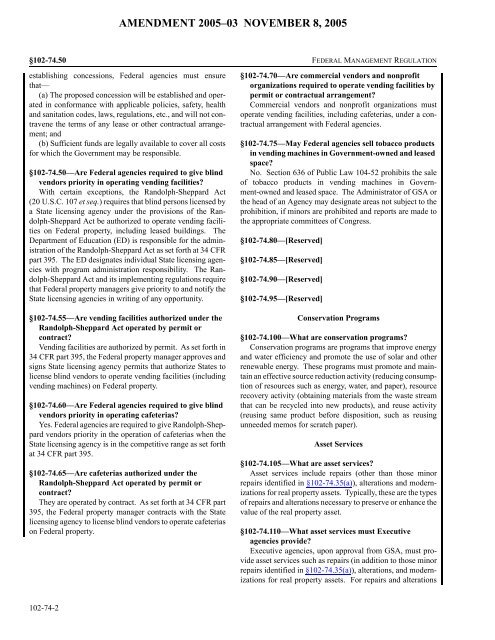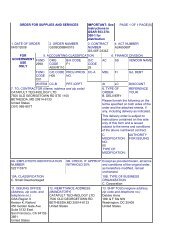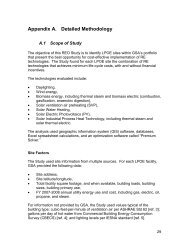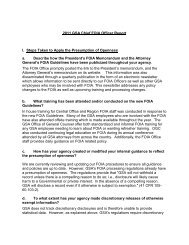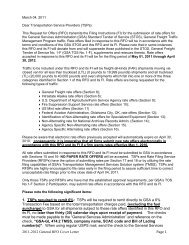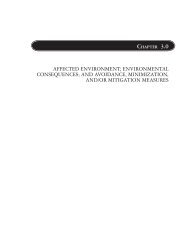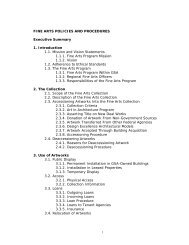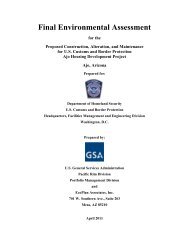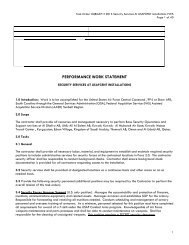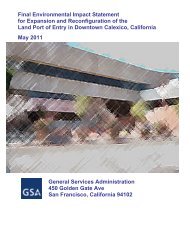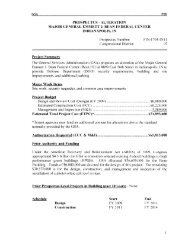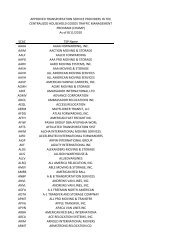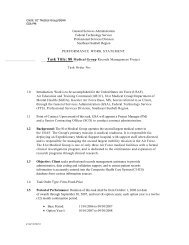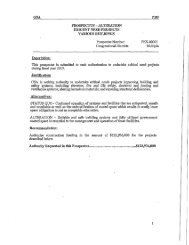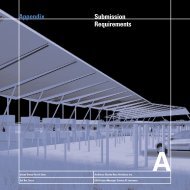FEDERAL MANAGEMENT REGULATION - GSA
FEDERAL MANAGEMENT REGULATION - GSA
FEDERAL MANAGEMENT REGULATION - GSA
You also want an ePaper? Increase the reach of your titles
YUMPU automatically turns print PDFs into web optimized ePapers that Google loves.
AMENDMENT 2005–03 NOVEMBER 8, 2005<br />
§102-74.50 <strong>FEDERAL</strong> <strong>MANAGEMENT</strong> <strong>REGULATION</strong><br />
establishing concessions, Federal agencies must ensure<br />
that—<br />
(a) The proposed concession will be established and operated<br />
in conformance with applicable policies, safety, health<br />
and sanitation codes, laws, regulations, etc., and will not contravene<br />
the terms of any lease or other contractual arrangement;<br />
and<br />
(b) Sufficient funds are legally available to cover all costs<br />
for which the Government may be responsible.<br />
§102-74.50—Are Federal agencies required to give blind<br />
vendors priority in operating vending facilities?<br />
With certain exceptions, the Randolph-Sheppard Act<br />
(20 U.S.C. 107 et seq.) requires that blind persons licensed by<br />
a State licensing agency under the provisions of the Randolph-Sheppard<br />
Act be authorized to operate vending facilities<br />
on Federal property, including leased buildings. The<br />
Department of Education (ED) is responsible for the administration<br />
of the Randolph-Sheppard Act as set forth at 34 CFR<br />
part 395. The ED designates individual State licensing agencies<br />
with program administration responsibility. The Randolph-Sheppard<br />
Act and its implementing regulations require<br />
that Federal property managers give priority to and notify the<br />
State licensing agencies in writing of any opportunity.<br />
§102-74.55—Are vending facilities authorized under the<br />
Randolph-Sheppard Act operated by permit or<br />
contract?<br />
Vending facilities are authorized by permit. As set forth in<br />
34 CFR part 395, the Federal property manager approves and<br />
signs State licensing agency permits that authorize States to<br />
license blind vendors to operate vending facilities (including<br />
vending machines) on Federal property.<br />
§102-74.60—Are Federal agencies required to give blind<br />
vendors priority in operating cafeterias?<br />
Yes. Federal agencies are required to give Randolph-Sheppard<br />
vendors priority in the operation of cafeterias when the<br />
State licensing agency is in the competitive range as set forth<br />
at 34 CFR part 395.<br />
§102-74.65—Are cafeterias authorized under the<br />
Randolph-Sheppard Act operated by permit or<br />
contract?<br />
They are operated by contract. As set forth at 34 CFR part<br />
395, the Federal property manager contracts with the State<br />
licensing agency to license blind vendors to operate cafeterias<br />
on Federal property.<br />
§102-74.70—Are commercial vendors and nonprofit<br />
organizations required to operate vending facilities by<br />
permit or contractual arrangement?<br />
Commercial vendors and nonprofit organizations must<br />
operate vending facilities, including cafeterias, under a contractual<br />
arrangement with Federal agencies.<br />
§102-74.75—May Federal agencies sell tobacco products<br />
in vending machines in Government-owned and leased<br />
space?<br />
No. Section 636 of Public Law 104-52 prohibits the sale<br />
of tobacco products in vending machines in Government-owned<br />
and leased space. The Administrator of <strong>GSA</strong> or<br />
the head of an Agency may designate areas not subject to the<br />
prohibition, if minors are prohibited and reports are made to<br />
the appropriate committees of Congress.<br />
§102-74.80—[Reserved]<br />
§102-74.85—[Reserved]<br />
§102-74.90—[Reserved]<br />
§102-74.95—[Reserved]<br />
Conservation Programs<br />
§102-74.100—What are conservation programs?<br />
Conservation programs are programs that improve energy<br />
and water efficiency and promote the use of solar and other<br />
renewable energy. These programs must promote and maintain<br />
an effective source reduction activity (reducing consumption<br />
of resources such as energy, water, and paper), resource<br />
recovery activity (obtaining materials from the waste stream<br />
that can be recycled into new products), and reuse activity<br />
(reusing same product before disposition, such as reusing<br />
unneeded memos for scratch paper).<br />
Asset Services<br />
§102-74.105—What are asset services?<br />
Asset services include repairs (other than those minor<br />
repairs identified in §102-74.35(a)), alterations and modernizations<br />
for real property assets. Typically, these are the types<br />
of repairs and alterations necessary to preserve or enhance the<br />
value of the real property asset.<br />
§102-74.110—What asset services must Executive<br />
agencies provide?<br />
Executive agencies, upon approval from <strong>GSA</strong>, must provide<br />
asset services such as repairs (in addition to those minor<br />
repairs identified in §102-74.35(a)), alterations, and modernizations<br />
for real property assets. For repairs and alterations<br />
102-74-2


